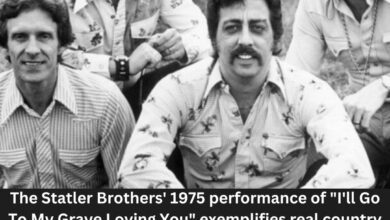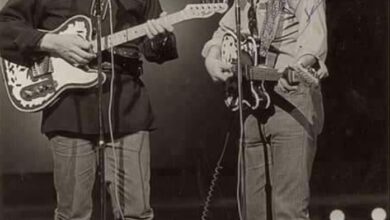Pain in his voice; he passed two months later, still a lion, yet weaker
Johnny Cash’s final live performance took place on July 5, 2003, at the Carter Family Fold in Hiltons, Virginia, marking a profoundly poignant moment in the music world. At 71 years old and in fragile health, Cash stood on stage just two months before his passing, his voice weathered but still resonant with the deep timbre that had defined his iconic sound for decades. This performance was not merely a concert but a testament to Cash’s enduring legacy as a musician and a man whose life and music were intertwined in a way that transcended mere performance.
Supported by a small band that included his son John Carter Cash, Johnny Cash opened the evening with his trademark greeting, “Hello, I’m Johnny Cash,” a phrase that had become synonymous with his larger-than-life presence. Despite his physical frailty, including severe vision loss and other health challenges, Cash delivered a set list that spanned his illustrious career. Classics like “Folsom Prison Blues,” “I Walk the Line,” and “Ring of Fire” echoed through the venue, each song carrying with it the weight of Cash’s personal and musical journey.
One of the most emotionally charged moments came when Cash performed “Angel Band,” a song famously sung by Emmylou Harris at the funeral of his beloved wife, June Carter Cash, who had passed away just months earlier. This poignant tribute underscored the depth of Cash’s loss and the enduring love he felt for June. Another highlight was his rendition of “Understand Your Man,” a song he hadn’t performed in over two decades. Its inclusion added a layer of nostalgia and reflection, perhaps hinting at Cash’s contemplation of his own mortality and the passage of time.
Throughout the evening, Cash’s interactions with the audience were marked by a mix of gratitude, introspection, and resilience. He spoke openly about June, acknowledging her presence in spirit and the profound influence she continued to have on his life and music. This connection between personal grief and public performance showcased Cash’s unique ability to channel raw emotion into his art, creating a deeply moving experience that resonated with everyone present.
Johnny Cash’s impact on American music was monumental. From his early days at Sun Records to his later collaborations with Rick Rubin, Cash’s career spanned multiple genres, including country, rockabilly, and folk. He was celebrated not only for his distinctive baritone voice and rebellious spirit but also for his ability to capture the human experience with unflinching honesty and empathy. His songs often delved into themes of love, faith, redemption, and the struggles of ordinary people, reflecting his own life’s triumphs and tribulations.
Beyond music, Johnny Cash was a figure of cultural significance. He used his platform to advocate for prison reform, drawing from his own experiences performing in penitentiaries and empathizing with the incarcerated. His humanitarian efforts and reflections on social issues, intertwined with his music, showcased a depth of character that went beyond the stereotypical image of a country music outlaw.
In his final performance, Cash’s voice, though weakened by age and illness, carried a weight that transcended mere melody. It was a voice that had seen hardship and joy, loss and redemption, and through it all, had connected deeply with audiences around the world. His legacy endures not only in the songs he left behind but in the indelible mark he left on the fabric of American music and culture.
Johnny Cash passed away on September 12, 2003, just months after this final performance. His death marked the end of an era but solidified his place as an enduring icon whose influence continues to resonate in the hearts of fans and musicians alike. His journey from humble beginnings in Arkansas to international stardom is a testament to the transformative power of music and the enduring spirit of an artist who never ceased to push boundaries and challenge conventions.
In sum, Johnny Cash’s final performance was a bittersweet farewell that encapsulated the essence of his life’s work: a testament to resilience, authenticity, and the unwavering pursuit of truth through music. It was a fitting closure to a legendary career that continues to inspire and influence generations of musicians and fans alike.





